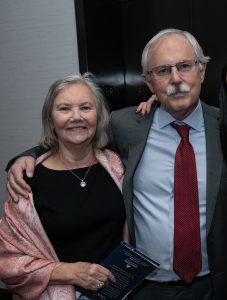Johns Hopkins UniversityEst. 1876
America’s First Research University

On April 5, 1991, a trip to Suburban Hospital — a Johns Hopkins community hospital located in Bethesda, Maryland — saved Cathy O’Donnell’s life.
That day, a car accident left her with no pulse at the scene and a low chance of survival, but a five-hour surgery ensured she’d pull through. The experience — plus the five weeks that Cathy and her family received support from staff, nurses, and doctors during her stay at the hospital — left a lasting impression.
In the following decades, Cathy and her husband, Earle, experienced life abroad, working in Turkey and earning master’s degrees in Ireland, before returning to Bethesda. But throughout, they have found ways to remain connected to the hospital, with the couple supporting Suburban’s recent 300,000-square-foot building addition and making a commitment to the hospital’s future in their estate plan. Cathy is also a former Suburban Hospital Foundation Board of Trustee member.
“Suburban Hospital relies heavily on the dedication of grateful patients and community members,” says Stacey Geldin, director of development at Suburban and a longtime friend of the O’Donnells. “Cathy and Earle exemplify that dedication, not just at the hospital, but as volunteers in their community.”
We talked with the O’Donnells to learn more about their longstanding relationship with Suburban.
Cathy: My doctors, Dr. J. Patrick Caufield and Dr. Juvenal Goicochea, have such personal empathy for their patients. They and the Suburban Hospital staff have done so much for me in saving my life and keeping me sane after the accident and through the subsequent surgeries I needed. I just feel I have to give back, and I’ll never give back enough.
Suburban remains the community hospital for me, my friends, and my family — twice our grandsons have needed to go to the ER over the years, and we were relieved to know they were at Suburban. I want it to always be there so that the next person who’s involved in a really bad accident has a good, safe place to go where the doctors are amazing, and where the nursing staff is caring and considerate and can help you and your family through the incident.
Earle: I’ve been impressed with Suburban’s determination to engage in this expansion, which has dramatically changed much of the hospital. It’s near the top of its class in a number of areas, which primarily helps the community. Suburban has become much more than a neighborhood hospital. It has stepped up its game for our benefit. How can we, as part of the community, not be equally committed to Suburban?
Cathy: I volunteered as soon as I was able to after the accident and was even on the Suburban Hospital Foundation Board for a few years. My first volunteer experience, though, was in the pre-op surgery area, where patients wait for their surgeries to start. Patients get a little antsy, so I would try to calm the waters. They could express their fears and concerns to me. If they had a question, I could then take it to the nurse. I let the patients know that we were there to help in any way we can, and I absolutely loved it. The people, the nurses I worked with, were great.
When I volunteered in pre-op, I also saw how people would want a minister to say a prayer over them. So, one of the things that we have donated to is the hospital’s chaplaincy program. That part of our lives is important too, and I wanted to provide people with that opportunity.
Earle: We hope it’ll be a good example for our kids to model, and to some degree that’s already been successful. Our kids are hitting a career level where they can start thinking about giving philanthropically, and we’re in dialogue with them about their giving plans and how we can contribute to them.
I think the underlying principle is you’re always trying to foster the good, and the longer the impact of that good, the better. Certainly the equipment we’ve contributed to in the hospital has a very long life, but people are perpetual. If what we do today can help people today, then there’s something blessed about my gifts continuing to do good for people long after I’m no longer here. Isn’t that a wonderful feeling?
Cathy: We want to make sure the hospital is here for the long term. Not just while we’re alive, but long into the future. Suburban is a hospital for today and tomorrow, and we want to make sure that tomorrow is funded.
Topics: Faculty and Staff, Friends of Johns Hopkins Medicine, Johns Hopkins Medicine, Promote and Protect Health, Strengthening Partnerships